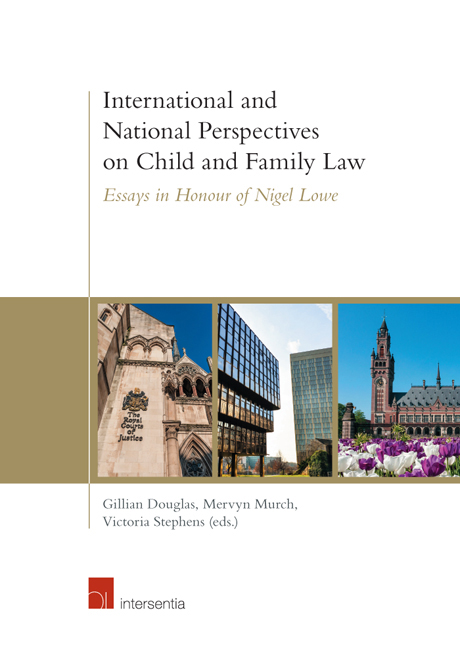Book contents
- Frontmatter
- Foreword
- Acknowledgements
- Contents
- List of Cases
- List of Contributors
- Introduction: Nigel Vaughan Lowe: An Appreciation
- Part I Family and Child Law in England and Wales
- Part II International Family Law
- Judging Parental Child Abduction: What Does it Mean to Adopt a Children's Rights-Based Approach?
- Judicial Activism: A 20-Year Evolution
- Globalisation of Adjudication in International Family Law: Serving International Families by Producing International Solutions
- Creating International Families: Private International Law and the Industry of Parenthood
- Issues in International Divorce Cases
- Non-Judicial Divorce in France: Progress or a Mess?
- The Istanbul Convention: Is Domestic Abuse Violence Against Women?
- Nationality and Migration Status in International Children's Law
- The Development of Child Protection Across International Borders for Children at Risk of Harm
- Nigel Lowe and International Family Law: An Immense Contribution
- The Spanish Constitutional Court and Protracted Child Abduction Proceedings: Time is of the Essence
- Non-Recognition of Child Marriages: Sacrificing the Global for the Local in the Aft ermath of the 2015 ‘Refugee Crisis’
- Juvenile Justice in Bulgaria: Reforms and Resistance
- Overriding Mandatory Provisions in EU Family Law Regulations
- Part III The Future for Family and Child Law
Judicial Activism: A 20-Year Evolution
from Part II - International Family Law
Published online by Cambridge University Press: 12 October 2018
- Frontmatter
- Foreword
- Acknowledgements
- Contents
- List of Cases
- List of Contributors
- Introduction: Nigel Vaughan Lowe: An Appreciation
- Part I Family and Child Law in England and Wales
- Part II International Family Law
- Judging Parental Child Abduction: What Does it Mean to Adopt a Children's Rights-Based Approach?
- Judicial Activism: A 20-Year Evolution
- Globalisation of Adjudication in International Family Law: Serving International Families by Producing International Solutions
- Creating International Families: Private International Law and the Industry of Parenthood
- Issues in International Divorce Cases
- Non-Judicial Divorce in France: Progress or a Mess?
- The Istanbul Convention: Is Domestic Abuse Violence Against Women?
- Nationality and Migration Status in International Children's Law
- The Development of Child Protection Across International Borders for Children at Risk of Harm
- Nigel Lowe and International Family Law: An Immense Contribution
- The Spanish Constitutional Court and Protracted Child Abduction Proceedings: Time is of the Essence
- Non-Recognition of Child Marriages: Sacrificing the Global for the Local in the Aft ermath of the 2015 ‘Refugee Crisis’
- Juvenile Justice in Bulgaria: Reforms and Resistance
- Overriding Mandatory Provisions in EU Family Law Regulations
- Part III The Future for Family and Child Law
Summary
The development of international family law, initiated by the 1980 Hague Abduction Convention and progressed by a number of other European and global instruments, led to the rapid rise of litigation in the many domestic courts of transnational jurisdiction. In the 1990s the younger judges felt the urge to communicate directly with a judge in the other court seised and a corresponding sense of frustration if prevented from doing so.
This natural development was not restricted to cross-border family proceedings. It was an equally prominent feature of international insolvency practice. Mr Justice Baragwanath of the New Zealand High Court drew attention to this developing trend, which he labelled ‘Judicial Activism’. I learned from him and was able to repay him with my experience in international family proceedings, which were not his sphere.
It has been said that the earliest reported case recording direct judicial collaboration was the Canadian case of D v B, decided on 17 May 1996 in the Superior Court of Quebec. In our law reports direct judicial communication seems to make its first appearance in the case of Re HB (Abduction: children's objections) [1998] 1 FLR 422. I was in the court together with Lady Justice Butler-Sloss and Sir John Vinelott. At first instance Wall J had endeavoured to establish direct communication, an endeavour which we supported. Another strong supporter of direct judicial communication in the Family Division was Singer J, who tackled the topic head on in his judgment in Re MJ (Abduction: international judicial collaboration) [2000] 1 FLR 803.
But these judicial pronouncements must be set in a much broader context. The 1980 Abduction Convention depended for its function on the creation and operation of Central Authorities, one in each state party to the convention. This was mandated. But the text of the Convention more or less took for granted the effective operation of judicial authority. That this was not a safe given was subsequently to be demonstrated by innumerable return applications malfunctioning in the courts of many states party to the Convention. As the mesh of countries operating the Convention steadily advanced and enlarged it became increasingly evident that the successful operation of the Convention depended not only upon the effective work of the Central Authorities but also upon the effective work of the judges.
- Type
- Chapter
- Information
- International and National Perspectives on Child and Family LawEssays in Honour of Nigel Lowe, pp. 147 - 152Publisher: IntersentiaPrint publication year: 2018



